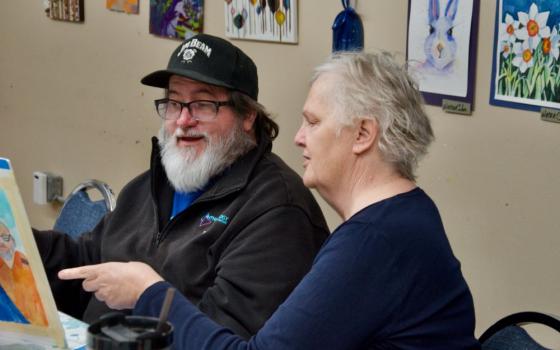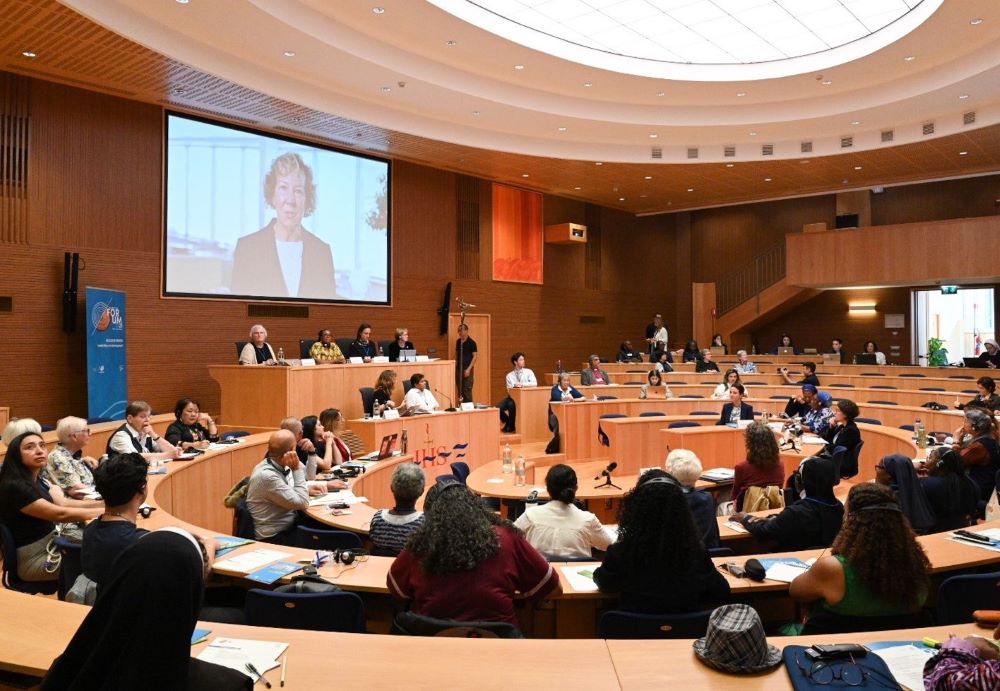
Susan Huber, board chair of the Global Solidarity Fund, delivers a video message during the two-day Advocacy Forum, sponsored by the International Union of Superiors General, in Rome. (Courtesy of UISG/Scatti Spontanei)
Just steps from where members of the Synod of Bishops have been meeting this month to consider the future of the Catholic Church, more than 100 sisters and allies also gathered to discuss systemic change.
But this group's focus was on changing the world, not just the church.
The two-day Advocacy Forum — sponsored by the International Union of Superiors General (UISG), the umbrella organization for leaders of Catholic women's congregations — included discussions on sustainable development, climate change, poverty, migration and human trafficking, and other social and economic issues that affect the world's most vulnerable people.
Billed as a "contribution to the synodal process of the Catholic Church," the Oct. 23-24 event at the Jesuit Curia was the culmination of a three-year project, called "Sisters Advocating Globally," which launched in 2020 in collaboration with the Global Solidarity Fund.
"I have no doubt that we religious are the changemakers of the 21st century," Dominican Sr. Durstyne Farnan, who serves as the U.N. representative for the Dominican Leadership Conference, said during one of the event's panels.
'I think the role sisters and UISG are playing in the synod are a symbol of the important journey of advocacy that they have been on for years.'
—Chiara Porro
In a video message to the forum, Susan Huber, board chair of the Global Solidarity Fund, noted that "women religious in the world are on the front lines of confronting major worldwide challenges" and said she hoped the new relationships created by this project will result in "strong and powerful leadership."
"I think the role sisters and UISG are playing in the synod are a symbol of the important journey of advocacy that they have been on for years," said Chiara Porro, the Australian ambassador to the Vatican, who chaired a panel on leadership and development.
Many speakers noted that the acute challenges of today's world demand a different kind of advocacy and leadership, one that prioritizes the voices from the grassroots over those from the top of the hierarchal pyramid.
"It is our encounter with Christ in the poor that richly informs our advocacy," said Mercy Sr. Maryanne Loughry of Australia, co-coordinator of the International Migrants and Refugees Network, a UISG project.
Maria Dolores Sanchez Galera, director of research and reflection for the Vatican Dicastery for Promoting Integral Human Development noted "the importance of listening, especially to those who are suffering."
"It is important to establish relationships with everyone," said Sr. Ruth del Pilar Mora, general councilor for the missions for the Salesian Sisters of Don Bosco, adding that this "new paradigm" means no one is excluded.
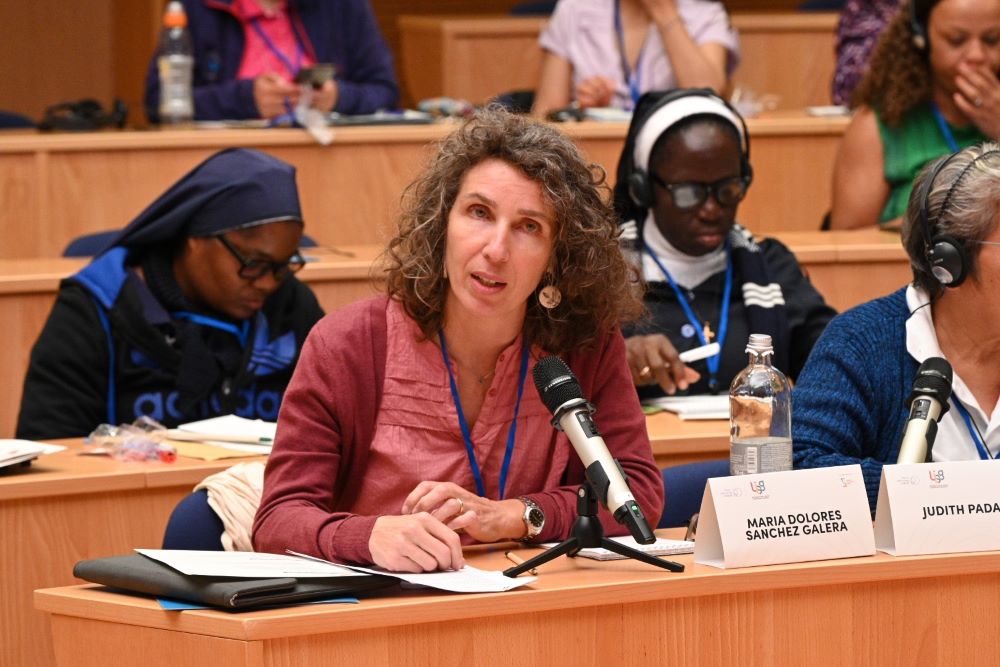
Maria Dolores Sanchez Galera, director of research and reflection for the Vatican Dicastery for Promoting Integral Human Development, speaks at the UISG Advocacy Forum in Rome. (Courtesy of UISG/Scatti Spontanei)
Salesian Sr. Nieves Crespo of Ethiopia said sisters' "prophetic advocacy" must empower people "so they may speak with their own voices based on their local reality."
Giusy D'Alconzo of the international organization Save the Children noted that advocacy should always begin with observing the reality on the ground. "As you are working every day, it is another very big asset that you sisters have," she said.
Daughter of Wisdom Sr. Jean Quinn said sisters use the tactic of "getting in the way," trying to get a seat at the table before someone says they cannot be there. "It's important that we be in that hall so we can say, 'This is the experience of the people in the grassroots.' "
Quinn, who is executive director of UNANIMA International, also stressed the importance of multiple voices and not doing advocacy in "silos."
Cooperation was a common theme from speakers and reports from six working groups at the forum.
In the report from the "Activating Communities and Networks" working group, Notre Dame Sr. Jyotisha Kannamkal, an environmental advocate from India, said they discussed "connecting all the stakeholders to have a deeper impact" and "going beyond the religious spaces and being open to networking with others."
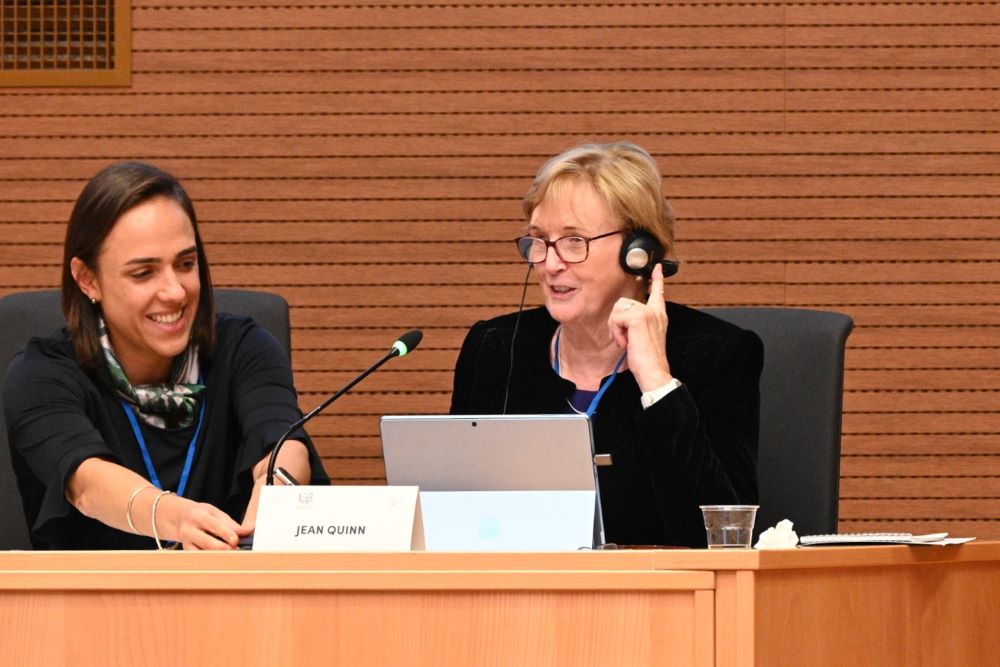
During the two-day UISG Advocacy Forum, Daughter of Wisdom Sr. Jean Quinn said sisters use the tactic of "getting in the way," trying to get a seat at the table before someone says they cannot be there. She is executive director of UNANIMA International. (Courtesy of UISG/Scatti Spontanei)
"Many participants in our group said they derive hope from knowing that we're not alone in what we do," said Sr. Maria José Rey Merodio in her report from the "Building a Narrative, Telling a Story" group.
Throughout the two days, many speakers referenced Laudate Deum, Pope Francis' recent apostolic exhortation on the climate crisis. Porro, the Australian ambassador, noted that the document "compels us to action."
"I think this is a crucial element, to rattle the boat a bit," she said.
Loreto Sr. Teresia Wamuyu Wachira of Kenya said that in Laudato Deum, Pope Francis "has said, once again, we can no longer sustain this world if we move the way we are moving."
"We need a paradigm shift of the way we live with each other," Wachira said. "As sisters we are called to be a sign of hope among the people."
Speakers at the forum also were urgent in their calls for a less consumerist, "regenerative" economy.
The world cannot ignore the present economic system and the "trauma it has left in the minds and in the hearts and in the bodies of 99% of the people living in this world," said Sr. Maamalifar Poreku.
"If we do not change this system, we are accomplices," said Poreku, who is a Missionary Sister of Our Lady of Africa from Ghana and coordinator of UISG's Sowing Hope for the Planet project.
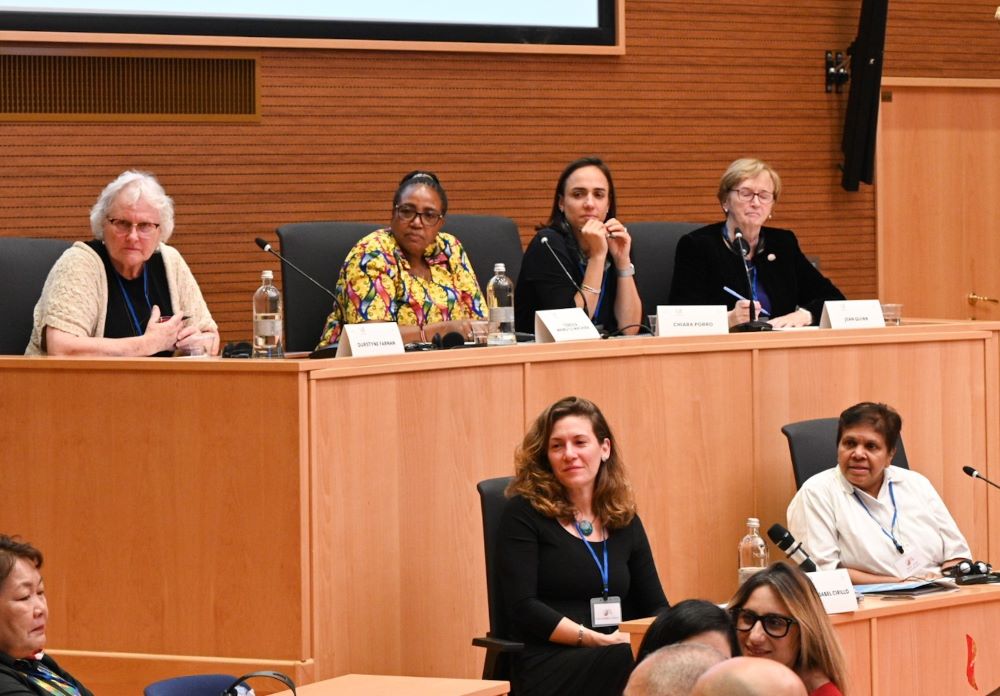
Participants listen during a session of the two-day Advocacy Forum, sponsored by the International Union of Superiors General, in Rome. (Courtesy of UISG/Scatti Spontanei)
Pointing to the inhumanity of the slave trade in the past, she asked, "What do we accept today that might be considered inhuman in the future?"
Rewriting a new economic history will require "systemic transformation" that includes engagement of Catholic sisters, she said. "We are not apart from this system, we are within it," she said.
Maryknoll Sr. Abby Avelino, international coordinator of Talitha Kum, UISG's anti-human trafficking project, urged conference attendees not to become "passive consumers of trafficking" through products, including electronics and clothing, made with forced labor.
"Human trafficking is a manifestation of extreme inequality," Avelino said. "The products that we buy connect us to modern slavery."
During a question-and-answer session, one conference attendee noted that peace will become a key issue, even more than climate change, in light of the conflict in Israel and Gaza.
A sister from Cameroon said she often feels that the conflict in her country, which has resulted in more than 1 million internally displaced persons, is not a priority. She also noted the difficulty of her travel to Rome for the conference. "My question is, 'Are we all represented here?' " she said, but added that at the forum, "already I feel empowered."
Some shared the difficulties of doing advocacy in the church. One sister from Eastern Europe said parishes refused to pray for an end to human trafficking because "we don't talk about sex in the church."
Advertisement
The Sisters Advocating Globally project began three years ago to create a network of sisters committed to social and environmental advocacy, and to collaborate with partners from civic groups, private sector organizations, other faith groups and academia.
In November 2022, the project held a dialogue on the environment, which led to a statement that called for a faith-driven vision for ecological conversion, including economic, educational, legislative and legal action.
In July 2023, a second dialogue, on migration, called for support for migrants and collaboration with governments, especially in the European Union.
In her concluding remarks at the forum, project coordinator Giulia Isabel Cirillo said the "unifying mission" is "the fight against exploitation, in all its forms," defined as "the abuse of power to extract benefit for some to the detriment of others."
"This is the connection to our multiple and disparate areas of work," Cirillo said. "This is a bright red line that delineates a common battle ground."
Cirillo praised sisters for valuing nonviolence and avoiding conflict and polarization.
"But sometimes, no matter how much we want to gather and collaborate and unify, we are called to struggle against something," she said. "Sometimes it is not possible to create the change we want with unification."
Such struggle does not have to be seen as negative, but rather as an opportunity, Cirillo said. "We should rejoice in that opposition as a source of strength."



